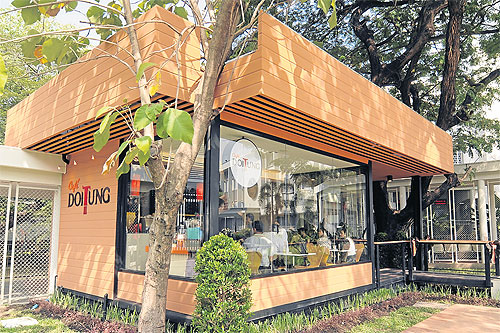
The first international outlet of Cafe{aac} DoiTung and Lifestyle Shop in Japan has done much to promote the work of the Mae Fah Luang Foundation's Doi Tung Development Project.

A Cafe´ DoiTung in Bangkok. The Thai coffee brand is branching out internationally, starting in Japan.
Opened in Josai Hospital in Ibaraki prefecture's Yuki city in July, the Thai coffee brand has already won the hearts of Japanese customers, with average sales of 285 cups a day.
Priced at 60 baht a cup, the coffee is inexpensive for Japan. "It's quite cheap compared with other popular brands," said project chairman MR Disnadda Diskul.
Cafe{aac} DoiTung is among the project's four sectors of food, tourism, craft and fashion, and agriculture services and landscape design.
Josai Hospital provides medical assistance to Asian countries including Thailand as part of the Japanese International Friendship and Welfare Foundation founded by the hospital.
MR Disnadda said Doi Tung plans to establish a coffee shop and exhibition at the headquarters of the US Drug Enforcement Agency in Washington.
The project has helped hilltribe people in northern Thailand to end opium cultivation by offering alternatives.
It began in 1986 after the Forestry Department asked the Mae Fah Luang Foundation to help solve deforestation caused by heavy encroachment of Doi Tung in Chiang Rai province.
Covering 93,515 rai, the project now offers holistic and integrated sustainable alternative livelihood development and is the culmination of the late Princess Mother's lifelong dedication to development work.
MR Disnadda said the popularity of the coffee brand is growing and he has received requests to open shops in South American countries such as Colombia, Ecuador and Peru.
"They also asked for information and support from the project for solving drug problems in their countries," he said.
"We hope the Doi Tung Development Project will become a model for social enterprise, a model to solve drug problems, alleviate poverty and create better lives for less advantaged people around the world."
Khunying Puangroi Diskul na Ayudhaya, executive director of the project, said sales revenue of 450 million baht is expected this year for a profit of 7-8% of revenue.
At least 520 million baht in revenue will be needed next year to cover costs while keeping profits at that level.
The project employs 1,500 people, more than 90% of whom are locals.
The nationwide introduction of the 300-baht daily minimum wage on Jan 1 will add 40 million baht to the project's costs next year, so it plans to introduce more premium items to offset rising costs.
The DoiTung brand comprises gift shops, housewares, fashion, mulberry products, coffee and macadamia nuts, plants and orchids, and landscape design.
Exports previously represented 30% of revenue, but the global economic woes have seen the figure drop to 20% this year.
Doi Tung also supplies products such as ceramic goods to Ikea, the global DIY furniture operator.
Ikea sets high standards, so the project's workers have improved their skills.
Gaisung Saehor, a village head in Chiang Rai's Mae Fa Luang district, said project workers enjoy better lives and higher incomes.
Some villagers earn 100,000 baht a year by growing coffee to supply the project.
This supplements the income of villagers who also grow rice for sale and their own consumption.
Over the past 30 years, many people believed villagers earned massive amounts from the drug trade, but in reality they only earned an average of 3,772 baht a year from growing opium, said Mr Gaisung.